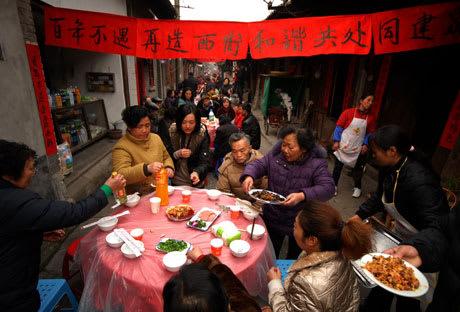The death of Grandma Jiang symbolizes the passing of a traditional way of life in modern China, according to this documentary. She lives in the West Street community of Dujiangyan, an ancient irrigation system in southwest China built 2,000 years ago. Countless generations have called West Street home, but now modernization and tourists are sweeping their traditional way of life aside.
Director Xun Yu documents the last two years of Grandma Jiang's life and the pain her demise causes her family, who are worried over relocating as the tourists invade.
Vanishing Spring Light is the first part of four films intended to chronicle the community's transformation and was produced by the same folks who brought us Up The Yangtze and Last Train Home. It's no surprise, since the same observational style is used. That means fly-on-the-wall footage and long takes. While this makes for a fine character study, the pace sometimes lags. Furthermore, the outside threat of modernization and tourists are too subtle to pose a genuine threat to the characters.
More gripping are the final weeks of Grandma Jiang, who lies on her deathbed waiting for the end to come as she smokes a cigarette. The pain comes in waves, she reports in a frail voice. When she asks the filmmaker to scratch her arms, we're alarmed with how bony they are. Rarely has a death on screen had such impact.
I'd like to see the future instalments of this ambitious series in order to calculate the story's full impact. Though I admire its craft, Vanishing Spring Light didn't move me – something is missing. The promised clash between old and new isn't spelled out yet, and I suspect we're seeing only a prologue to a grander tale.
(Kinosmith)Director Xun Yu documents the last two years of Grandma Jiang's life and the pain her demise causes her family, who are worried over relocating as the tourists invade.
Vanishing Spring Light is the first part of four films intended to chronicle the community's transformation and was produced by the same folks who brought us Up The Yangtze and Last Train Home. It's no surprise, since the same observational style is used. That means fly-on-the-wall footage and long takes. While this makes for a fine character study, the pace sometimes lags. Furthermore, the outside threat of modernization and tourists are too subtle to pose a genuine threat to the characters.
More gripping are the final weeks of Grandma Jiang, who lies on her deathbed waiting for the end to come as she smokes a cigarette. The pain comes in waves, she reports in a frail voice. When she asks the filmmaker to scratch her arms, we're alarmed with how bony they are. Rarely has a death on screen had such impact.
I'd like to see the future instalments of this ambitious series in order to calculate the story's full impact. Though I admire its craft, Vanishing Spring Light didn't move me – something is missing. The promised clash between old and new isn't spelled out yet, and I suspect we're seeing only a prologue to a grander tale.
